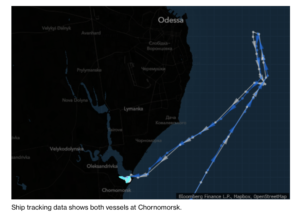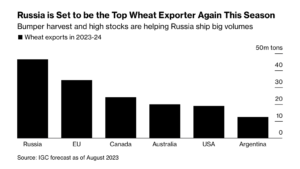As a result of the attack on Iran, nitrogen fertilizer at the port of New Orleans has seen an increase in price this week. Urea prices for barges in New…
Two Grain Ships Arrive in Black Sea Port Using “Humanitarian Corridor”
Reuters writers Pavel Polityuk, Olena Harmash and Michelle Nichols reported on Saturday that, “Two cargo vessels arrived in Ukraine on Saturday, Ukrainian port authorities said, the first ships to use a temporary corridor to sail into Black Sea ports and load grain for African and Asian markets.
❗️First civilian vessels use the temporary corridor to reach Ukrainian ports ❗️
— Oleksandr Kubrakov (@OlKubrakov) September 16, 2023
After using a temporary corridor to allow ships blocked by Russian aggression to leave the ports of Odesa, Chornomorsk and Pivdennyi, the bulk carriers RESILIENT AFRICA and AROYAT confirmed their… pic.twitter.com/5q2HW2lZJ4
“Ukraine last month announced a ‘humanitarian corridor’ in the Black Sea to release ships trapped in its ports since the start of the war in February 2022 and to circumvent a de facto blockade after Russia abandoned a deal to let Kyiv export grain.
“Five vessels have so far left the port of Odesa, using the corridor which hugs the western Black Sea coast near Romania and Bulgaria.”
The article noted that, “The Ukrainian Sea Ports Authority, in a post on Facebook, said the bulk carriers ‘Resilient Africa’ and ‘Aroyat’ had arrived in the port of Chernomorsk.
“They were due to load almost 20,000 tonnes of wheat for Africa and Asia, Deputy Prime Minister Oleksandr Kubrakov said earlier.”
Also Saturday, Bloomberg writers Aine Quinn and Kateryna Choursina reported that, ”
Ukraine is defying Russia’s de-facto blockade of its Black Sea ports by sending empty ships to collect grain for the first time since a safe-passage deal collapsed almost two months ago.
“Two ships ‘confirmed their readiness to use the route to the port of Chornomorsk to load almost 20,000 tons of wheat for Africa and Asia,’ Infrastructure Minister Oleksandr Kubrakov said on social media. The ships carry the flags of Palau and crew members are from Turkey, Azerbaijan, Egypt and Ukraine.
Encouraged to hear last night that two civilian ships have entered a Black Sea port to load nearly 20,000 tons of grain for African and Asian countries — the first ships to arrive since Russia’s cynical withdrawal from the Black Sea Grain Initiative. Russia’s response? Dawn…
— Ambassador Bridget A. Brink (@USAmbKyiv) September 17, 2023
“Both vessels were at the port of Chornomorsk as of Saturday evening, according to ship tracking data.”

New York Times writers Matthew Mpoke Bigg and Vivek Shankar reported on Sunday that, “But establishing a corridor secure enough for a regular flow of cargo vessels to sail from Ukraine’s seaports is risky, not least because the Black Sea has become an increasingly critical theater in the war as Ukraine contests Russia’s naval dominance.”
The Times article explained that, “Underlining the risks, Russia launched a drone and missile attack early Sunday on the Odesa region of southern Ukraine.
“A granary and farmland north of the port city of Odesa were hit, according to Oleh Kiper, the head of the regional military administration. Air defenses intercepted six drones and six missiles, the Ukrainian Air Force said in a post on the Telegram messaging app. The claims could not be independently verified.”
The Times article reminded readers that, “In addition to abrogating the grain deal, Russia said in July that it would consider any ship sailing into a Ukrainian port as potentially carrying military cargo, in a clear warning to civilian shipping. Last month, a Russian patrol vessel fired warning shots at a civilian vessel on the Black Sea and then boarded it to conduct an inspection.
Proud to join our U.S. delegation at the port of Constanta, Romania, together with Ukrainian, Romanian, Moldovan, and EU officials. This was the second meeting in support of Ukrainian grain exports and global food security by investing in Danube riverine ports. pic.twitter.com/FG42eDiib6
— Ambassador Bridget A. Brink (@USAmbKyiv) September 15, 2023
“Turkey, Bulgaria and Romania — three of the six countries that border the Black Sea — are NATO members, a fact that would most likely act as a deterrent to any country seeking to attack a ship in its waters. Kyiv, however, does not benefit from the alliance’s protective umbrella, though it is pressing for membership, which President Volodymyr Zelensky of Ukraine sees as a major strategic objective.”
In the face of Russia’s withdraw from the Black Sea Grain Initiative and its devastating attacks on Ukraineʼs ports and grain silos, we are working 24/7 with our regional partners to expand the export of Ukrainian agricultural products through the Danube riverine routes. This… pic.twitter.com/9S9cdbbGzH
— Ambassador Bridget A. Brink (@USAmbKyiv) September 16, 2023
Meanwhile, Bloomberg writer Aine Quinn reported on Saturday that, “Russia’s second consecutive bumper wheat harvest is reinforcing its position as the No. 1 exporter, but it’s also easing price pressures stemming from Moscow’s invasion of Ukraine.”

Quinn pointed out that, “The Kremlin’s war — including blockading and bombarding ports — has hobbled Ukraine’s food exports, helping cement Russia’s domination of the global wheat market. That’s reflected in record Russian shipments, as the nation’s traders overcome the financing and logistical challenges some faced in the aftermath of the invasion.
“However, Russia’s overflowing grain ports have also yielded a silver lining for wheat consumers buffeted by a cost-of-living crisis: the lowest prices in almost three years.”





